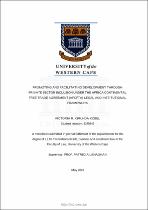| dc.description.abstract | Free Trade Agreements (FTAs) have been fronted as vehicles for economic development by various scholars and economic organisations at large. But what is development? This is an important question which must be answered. Chidede, in his work, states that the term development has no universal definition but, at a more general level, entails a process, which aims at the constant improvement of the well-being of the entire population and all individuals on the basis of their active, free and meaningful participation in development and in the fair distribution of benefits resulting therefrom1 . This is an acceptable standard by which to judge development, especially in light of what has been termed as “sustainable development goals” 2. It is against this backdrop that this study aims to investigate the potential of the African Continental Free Trade Agreement (AfCFTA)3 to bring about not only development, but also inclusive development with a major focus on its ability to promote private sector inclusiveness, a key component to realising its agenda. | en_US |

